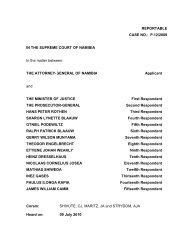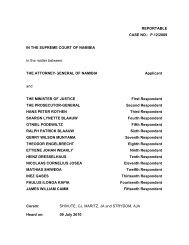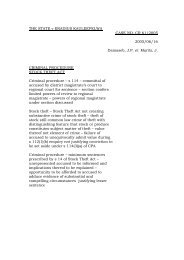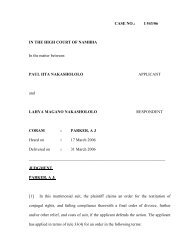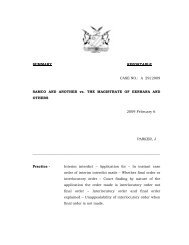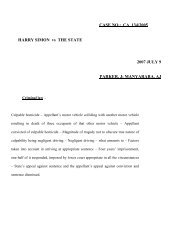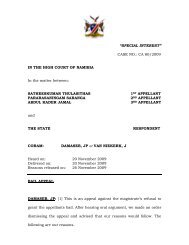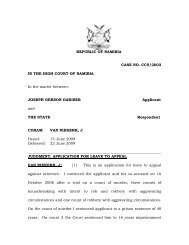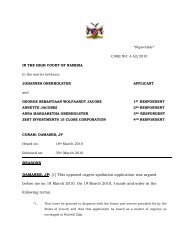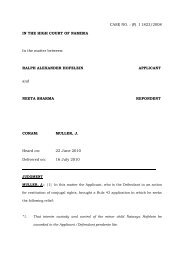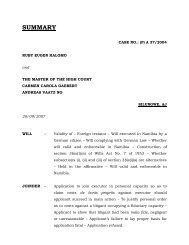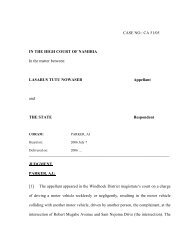Adriaan Jacobus Peinaar v The State.pdf - Superior Courts of Namibia
Adriaan Jacobus Peinaar v The State.pdf - Superior Courts of Namibia
Adriaan Jacobus Peinaar v The State.pdf - Superior Courts of Namibia
- No tags were found...
Create successful ePaper yourself
Turn your PDF publications into a flip-book with our unique Google optimized e-Paper software.
CASE NO.: CA 30/2010IN THE HIGH COURT OF NAMIBIAIn the matter between:JACOBUS ADRIAAN PIENAARAPPELLANTandTHE STATERESPONDENTCORAM:MULLER, JHeard on: 22 September 2010Delivered on: 05 October 2010BAIL APPEAL JUDGMENTMULLER, J.: [1] This is an appeal against the refusal <strong>of</strong> bail for the Appellanton 2 occasions, namely on 14 December 2009 and 29 April 2010, respectively.<strong>The</strong> Appellant gave notice <strong>of</strong> appeal against both such refusals on 10 May 2010in which he included his grounds <strong>of</strong> appeal. Earlier the Appellant had filed anotice <strong>of</strong> appeal which was apparently against the December 2009 refusal <strong>of</strong>bail. Some grounds or reasons for appeal were contained in that notice, but theAppellant‟s main complaints at that stage seem to be the unavailability <strong>of</strong> the
2record <strong>of</strong> that bail hearing in the notice <strong>of</strong> appeal dated 10 May 2010. Both theappeals seem to be incorporated in one Notice and the grounds set out thereinare consequently the grounds <strong>of</strong> appeal against both decisions by the sameMagistrate, who heard both bail applications. I shall refer to those groundslater herein.[2] Before I deal with the appeal set down for hearing on 22 September2010, it is necessary to say something about the manner in which the <strong>State</strong>has handled this appeal. A date for the hearing <strong>of</strong> this appeal was speciallyarranged during the Court recess on 11 August 2010, but on that date MrKuutondokwa, who appeared for the <strong>State</strong>, informed the Court that he wasgiven the appeal only minutes before it was due to commence. Consequently,he was unable to argue the appeal. It must be mentioned that the appealdocuments comprise <strong>of</strong> 2 volumes. Understandably the Appellant was notamused to say the least. He is in custody since December 2009 and was fullyprepared to argue his appeal. In the circumstances, however prejudicial to theAppellant, the Court had no choice than to postpone the appeal to a later day.<strong>The</strong>se circumstances were compounded by the fact that it was in the Courtrecess and an effort was made to set the appeal down for hearing at thesoonest date that I would be available. Reluctantly, I postponed the appeal tothe 22 nd September 2010 and ordered the <strong>State</strong> to file its heads <strong>of</strong> argumentand serve it on the Appellant not later than 31 August 2010. <strong>The</strong> Courtexpressed its dissatisfaction with the conduct <strong>of</strong> the <strong>State</strong> to Mr
3Kuutondokwa, who is not to blame, and made it clear that if the <strong>State</strong> doesnot file its heads <strong>of</strong> argument in time and/or is not ready to argue the appealon 22 September 2010, the appeal shall still be heard. <strong>The</strong> Appellantconfirmed that the document in his handwriting with the heading “AppellantsHeads <strong>of</strong> Argument”, dated 22 June 2010, is indeed his heads <strong>of</strong> argument.[3] On 22 September 2010 the Mr Heathcote, assisted by Ms Van DerMerwe, appeared on behalf <strong>of</strong> the Appellant and Mr Small represented the<strong>State</strong>. <strong>The</strong> <strong>State</strong>‟s heads <strong>of</strong> arguments had been filed in time as stated aboveand Mr Heathcote filed additional heads. Both Mr Heathcote SC and Mr Smallamplified their respective heads with oral submissions.[4] It is appropriate to set out the law applicable to bail appeals at thisjuncture. <strong>The</strong> Appellant„s appeal is brought in terms <strong>of</strong> S65 <strong>of</strong> the CriminalProcedure Act, no. 51 <strong>of</strong> 1977 (CPA), as amended and applicable to <strong>Namibia</strong>. S65(4) <strong>of</strong> the CPA states the following:“<strong>The</strong> court or judge hearing the appeal shall not to set aside thedecision against which the appeal is brought, unless such court orjudge is satisfied that the decision was wrong, in which event thecourt or judge shall give the decision which in its or his opinion thelower court should have given.”
4[5] <strong>The</strong> locus classicus in respect <strong>of</strong> bail appeals is the case <strong>of</strong> S v Barber1979(4) SA 218 (D & CLD) where Hefer J, as he then was, formulated thepowers <strong>of</strong> an appeal court in respect <strong>of</strong> bail as follows at 220E-F:“It is well known that the powers <strong>of</strong> this Court are largely limited wherethe matter comes before it on appeal and not as a substantive applicationfor bail. This Court has to be persuaded that the Magistrate exercised thediscretion which he has wrongly. Accordingly, although this Court mayhave a different view, it should not substitute its own view for that <strong>of</strong> theMagistrate‟s exercise <strong>of</strong> his direction. I think it should be stressed that nomatter what this Court‟s own views are, the real question is whether it canbe said that the Magistrate who had the discretion to grant bail exercisedthat discretion wrongly.”(Also S v De Abreu 1980 (4) 94 (W) at 96H – 97A). In S v Du Plessis 1992NR 74 (HC) at 78A-E O‟Linn J (with Frank J concurring) approved whatHefer J has said in the Barber case supra, and further quoted withapproval Hefer J‟s reasons for that decision. Similarly, this court in a bailappeal in S v Timotheus 1995 NR 109 (HC) on 112J -113C repeated withapproval the enunciation <strong>of</strong> Hefer J in the Barber case supra. With regardto the likelihood <strong>of</strong> an accused absconding if bail is granted, O‟Linn Jreferred to a list <strong>of</strong> considerations as formulated by Mahomed J in S vAcheson 1991(2) SA 805 (Nm), 1991 NR1 (HC) at 19E-20F. (S v DuPlessis, supra at 86 E-87C).
5[6] Mohamed J also dealt in the Acheson case with the primary importance<strong>of</strong> the <strong>Namibia</strong>n Constitution and the rights enshrined therein when thegranting <strong>of</strong> bail is considered. He‟s formulation in this regard had <strong>of</strong>ten beenfollowed:<strong>The</strong> law requires me to exercise a proper discretion having regard, not onlyto all the circumstances <strong>of</strong> the case and the relevant statutory provisions,but against the backdrop <strong>of</strong> the constitutional values now articulated andenshrined by the <strong>Namibia</strong>n Constitution <strong>of</strong> 1990.<strong>The</strong> constitution <strong>of</strong> a nation is not simply a statute which mechanicallydefines the structures <strong>of</strong> government and the relations between thegovernment and the governed. It is a „mirror reflecting the national soul‟,the identification <strong>of</strong> the ideals and aspirations <strong>of</strong> a nation, the articulation<strong>of</strong> the values bonding its people and disciplining its government. <strong>The</strong> spiritand the tenor <strong>of</strong> the constitution must therefore preside over and permeatethe processes <strong>of</strong> judicial interpretation and judicial discretion.Crucial to that tenor and that spirit is its insistence upon the protection <strong>of</strong>personal liberty in art 7, the respect for human dignity in art 8, the right <strong>of</strong>an accused to be brought to trial within a reasonable time in art 12(1)(b)and the presumption <strong>of</strong> innocence in art 12(1)(d).I think Mr Grobbelaar was correct in submitting that I should have regardto these provisions in exercising my discretion. <strong>The</strong>y constitute part <strong>of</strong> theconstitutional culture which should influence my discretion. No judicial
6<strong>of</strong>ficer should ignore that culture, where it is relevant, in the interpretationor application <strong>of</strong> the law or in the exercise <strong>of</strong> a discretion.(S v Acheson, supra, 9J – 10C)[7] In the application <strong>of</strong> the relevant section <strong>of</strong> the CPA, it should bekept in mind that the CPA, as applicable in <strong>Namibia</strong>, has been amendedsince <strong>Namibia</strong>‟s independence, including several sections concerningbail. <strong>The</strong> Criminal Procedure Amendment Act, no 5 <strong>of</strong> 1991 amendedseveral sections regarding bail, namely sections 59(1)(a), 60(1), 61, 68(3),72(1)(a), 307(2)(a), as well as Schedule 2, Part III <strong>of</strong> the Principal Act.Also in South Africa the CPA was amended materially in regard to bail.<strong>The</strong> old South African S 60(1), which is basically the same as our S 60(1),has been substantially altered by several amendments to it since 1995.<strong>The</strong> new amended S 60 <strong>of</strong> the CPA in South Africa now contains 14subsections with very important provisions regarding bail. <strong>The</strong>constitutionality <strong>of</strong> some <strong>of</strong> these subsections, eg. subsections (11) and(11B) have been tested in the South African Constitutional Court butfound not to be unconstitutional. (S v Dlamini and others cases 1999(4)SA 623 (CC), 1999(2) SACR 51 (CC).) In <strong>Namibia</strong> courts shouldconsequently be cautious when applying the relevant sections <strong>of</strong> the CPAregarding bail and not rely on South African Court decisions which maybe based on those sections which are not applicable to <strong>Namibia</strong>.
7[8] S 60(1) is applicable to an application by an accused person forbail and reads as follows:“An accused who is in custody in respect <strong>of</strong> any <strong>of</strong>fence may at hisor her first appearance in a lower court or at any stage after suchappearance, apply to such court or, if the proceedings against theaccused are pending in the High Court, to that court, to be releasedon bail in respect <strong>of</strong> such <strong>of</strong>fence, and any such court may releasethe accused on bail in respect <strong>of</strong> such <strong>of</strong>fence on condition that theaccused deposits with the clerk <strong>of</strong> the court or, as the case may be,the registrar <strong>of</strong> the court, or with a member <strong>of</strong> the prisons service atthe prison where the accused is in custody, or, in the case <strong>of</strong> aperiodical court, if no clerk <strong>of</strong> the court is available, with a police<strong>of</strong>ficial at the place where the accused is in custody, the sum <strong>of</strong>money determined by the court in question.”[9] In respect <strong>of</strong> S 61 <strong>of</strong> the CPA there were important changes effected bysubsequent amendments. In South Africa S 61 has been repealed in its entiretyby S 4 <strong>of</strong> Act 75 <strong>of</strong> 1995, most probably because most <strong>of</strong> its substance wasincorporated in the comprehensive S 60(1) referred to supra. In <strong>Namibia</strong>,however, a new S61 was inserted in the CPA by Act 5 <strong>of</strong> 1991. S 61 now reads:“If an accused who is in custody in respect <strong>of</strong> any <strong>of</strong>fence referred to inPart IV <strong>of</strong> Schedule 2 applies under section 60 to be released on bail inrespect <strong>of</strong> such <strong>of</strong>fence, the court may, notwithstanding that it is satisfied
8that it is unlikely that the accused, if released on bail, will abscond orinterfere with any witness for the prosecution or with the policeinvestigation, refuse the application for bail if in the opinion <strong>of</strong> the court,after such inquiry as it deems necessary, it is in the interest <strong>of</strong> the publicor the administration <strong>of</strong> justice that the accused be retained in custodypending his or her trial”.[10] S 61 <strong>of</strong> our CPA has been the subject <strong>of</strong> several decisions <strong>of</strong> our <strong>Courts</strong>.After referring to the new S 61, O‟Linn J (with Frank J concurring) stated in S vDu Plessis and Another 1992 NR 74 (HC) at 85C – 86A:I have already indicated supra that one possible form <strong>of</strong> interest <strong>of</strong> thepublic is the second ground on which the Attorney-General could relyunder the repealed S 61, namely that the release on bail is likely toconstitute a threat to the safety <strong>of</strong> the public or the maintenance <strong>of</strong> thepublic order.Other examples <strong>of</strong> the possible application <strong>of</strong> the new grounds are: theaccused satisfies the Court on a balance <strong>of</strong> probabilities that it is unlikely,ie improbable, that he or she will abscond or will interfere with <strong>State</strong>witnesses or with the investigations <strong>of</strong> the case. <strong>The</strong> Court is, however,convinced that there remains a reasonable possibility that the accused willabscond or will interfere with <strong>State</strong> witnesses or will interfere with theinvestigation.
9In such a case, in my view, where it has in addition been prima facieshown that the accused is guilty <strong>of</strong> one or more <strong>of</strong> the serious crimes or<strong>of</strong>fences listed in the aforesaid part IV <strong>of</strong> the second schedule or where atleast the witnesses for the <strong>State</strong> testify that there is a strong case againstthe accused or the accused admits that he or she is guilty <strong>of</strong> such a crimeor <strong>of</strong>fence, then the Court, after considering all the relevant circumstances,will be entitled to refuse bail, even if there is a reasonable possibility thatthe accused will abscond or interfere with <strong>State</strong> witnesses or with theinvestigation.It may be that when the investigation is not complete and/or where stolengoods or other exhibits have not yet been recovered in cases <strong>of</strong> theaforesaid gravity and/or where a large number <strong>of</strong> accused are involvedand charged as co-accused in the same case, that the <strong>State</strong>‟s case againstall or several accused will be severely prejudiced if one or more <strong>of</strong> the coaccusedabscond.In such case there may even be a real danger that the accused persons,other than the particular applicant, or persons not yet detained mayinterfere with the applicant if released, because the applicant‟s evidenceshould he testify in the trial, may be potentially very damaging to suchother accused or person.In such a case it may very well be that it will be in the interest <strong>of</strong> theadministration <strong>of</strong> justice not to take the risk to allow such applicant out on
10bail even where it is not likely or probable that applicant will abscond orhimself interfere with <strong>State</strong> witnesses or with the prosecution.In further support <strong>of</strong> this approach is the fact that the application <strong>of</strong> thetraditional approach in this respect has not been effective in thecircumstances presently prevailing in <strong>Namibia</strong>, to prevent the dramatic andgrave escalation <strong>of</strong> crime and <strong>of</strong> instances where persons accused <strong>of</strong>serious crime have absconded. For this very reason wider powers andresponsibilities have been vested in courts to deal more effectively with theproblem.”(Also Albert Ronnie Du Plessis v S, and unreported judgment by O‟Linn J,delivered on 15 May 1992; Timoteus Joseph v S, an unreported judgment byStrydom JP, delivered on 22 August 1995; S v Acheson, supra, at 823E; S vPineiro and Others 1992(1) SARC (Nm) at 580b-d; Charlotte Helena Botha v S,an unreported judgment delivered by O‟Linn J on 20 October 1995; BenitaGroenewald v S, an unreported judgment delivered by Mtambanengwe J on 16August 1995; and Julius Dausab v S, an unreported judgment delivered byNamandje AJ on 20 September 2010.)[11] Generally, in respect <strong>of</strong> the approach by a court in a democratic societywhere specific rights <strong>of</strong> an individual are entrenched in a constitution (such asthe <strong>Namibia</strong>n Constitution) to grant or refuse bail, the following, as stated byCachalia AJ (as he the was) in S v Branco 2002 (1) SACR 531 (WLD) at 532h –
11533c, with reliance on the <strong>Namibia</strong>n decision by Mohamed J in S v Acheson,supra, should be kept in mind:<strong>The</strong> fact that the Appellant bears the onus does not mean that the <strong>State</strong>can adopt a passive role by not adducing any or sufficient rebuttingevidence in the hope that the Appellant might not discharge the onus. (SeeS v Jonas 1998 (2) SACR 677 (SE); S v Mauk (supra).) It must however beborne in mind that any court seised with the problem <strong>of</strong> whether or not torelease a detainee on bail must approach the matter from the perspectivethat freedom is a precious right protected by the Constitution. Suchfreedom should only be lawfully curtailed if the interests <strong>of</strong> justice sorequire….<strong>The</strong> fundamental objective <strong>of</strong> the institution <strong>of</strong> bail in a democratic societybased on freedom is to maximize personal liberty. <strong>The</strong> proper approach toa decision in a bail application is that:„<strong>The</strong> court will always grant bail where possible, and will lean infavour <strong>of</strong> and not against the liberty <strong>of</strong> the subject provided that it isclear that the interests <strong>of</strong> justice will not be prejudiced thereby.‟Per Harcourt J in S v Smith and Another 1969 (4) SA 175 (N) at 177E-F.In S v Acheson 1991 (2) SA 805 (Nm), Mahomed AJ (as he then was)emphasized that-„An accused person cannot be kept in detention pending his trial as a form<strong>of</strong> anticipatory punishment. <strong>The</strong> presumption <strong>of</strong> the law is that he isinnocent until his guilt has been established in court. <strong>The</strong> court will
12therefore ordinarily grant bail to an accused unless this is likely toprejudice the ends <strong>of</strong> justice.”[12] It is apposite to briefly refer to the history <strong>of</strong> this matter without goinginto detail:o <strong>The</strong> Appellant, a South African citizen, was arrested in Windhoekon about 20 November 2009. Two other persons were also arrestedfor apparently the same <strong>of</strong>fences.o 9 charges <strong>of</strong> fraud were brought against the Appellant in a totalamount <strong>of</strong> N$340 000;o On 14 December 2009 the Appellant applied for bail and a formalbail hearing was conducted. At that stage the Appellant deniedthat it was in the interest <strong>of</strong> justice to refuse him bail. He alsosubmitted that he would not abscond; that although he hasprevious convictions in South Africa, he is a first <strong>of</strong>fender in<strong>Namibia</strong>; that his wife is ill; that he suffers from 3 chronicdiseases, namely diabetes, asthma and claustrophobia. He alsorelied on sections <strong>of</strong> the Constitution <strong>of</strong> <strong>Namibia</strong> warranting hisconstitutional rights;o His bail application was refused;o Subsequently, he brought an application to the High Court <strong>of</strong><strong>Namibia</strong> and on 30 December 2009 an order was made to the
13effect that the Appellant be taken to hospital and be medicallyexamined;o Following that medical examination, a certain Dr Ockie Joostestated in a report that the Appellant suffers from a phobic anxietydisorder and recommended that he should stay under supervisionin hospital. Furthermore, after x-rays were taken, it was discoveredthat the Appellant has an enlargement <strong>of</strong> the heart and an echocardiograph was recommended;o Further applications by the Appellant to the High Court followed,but further tests were apparently not done, because <strong>State</strong> fundingwas not available;o <strong>The</strong> Appellant brought a further bail application on new grounds,in which he i.a. relied on the alleged findings <strong>of</strong> the doctors. Thatapplication for bail was also refused; ando After the Appellant‟s notice <strong>of</strong> appeal against the refusal <strong>of</strong> bothbail applications was filed, the Magistrate furnished additionalreasons for his decisions.[13] As mentioned before, it appears that the Appellant combined hisobjections to the two bail application judgments in a single set <strong>of</strong> groundscontained in his notice <strong>of</strong> appeal dated 10 May 2010. <strong>The</strong> fact that he did notindicate which <strong>of</strong> the grounds are relevant to which judgment makes itdifficult to properly evaluate those grounds. It should also be remembered that
14the second bail application was in fact brought because the Appellant believedthat there were new grounds in addition to the grounds which had alreadybeen considered in the first bail application and which new grounds wouldentitle him to be granted bail. <strong>The</strong>se new grounds comprised <strong>of</strong> two groundsthat had to do with the condition <strong>of</strong> his health and another regarding thealleged changed attitude <strong>of</strong> the investigating <strong>of</strong>ficer, namely not to oppose bailanymore.[14] <strong>The</strong> Appellant‟s grounds <strong>of</strong> appeal in his notice <strong>of</strong> appeal are thefollowing (unedited):<strong>The</strong> learned Magistrate made numerous mistakes in his approach tolaw, and the facts, they are:1. <strong>The</strong> Magistrate ignored section 10(i) when he ruled that applicantcan not get bail because the applicant have got no assets orfamily in <strong>Namibia</strong>.1.a)In the very same case accused no. 2, also a South African,also with no assets or family, was granted N$5 000.00 bail.1.b)<strong>The</strong> <strong>Namibia</strong>n Constitution in Section 10(i) is very clear allpersons shall be equal before the law.2. <strong>The</strong> learned magistrate also misdirect himself to rule thatapplicant is the “main brain” when the learned magistrate ask
15the state if they want to go into the merit <strong>of</strong> the case, the <strong>State</strong>replied: No;3. <strong>The</strong> learned magistrate also misdirect himself or ignored thefollowing facts:3.1 <strong>The</strong> investigating <strong>of</strong>ficer, inspector Louw testified that hehas got no evidence that applicant previously didabscond.3.2 <strong>The</strong> investigating <strong>of</strong>fice testified that applicant waspreviously in a Pre-Independent <strong>Namibia</strong> released on avery serious charges <strong>of</strong> fraud on bail and applicant didstand trial and was found not guilty.3.3 <strong>The</strong> so-called crimes were apparently committed over thephone and the investigating <strong>of</strong>ficer did not conduct anidentification parade.3.4 <strong>The</strong> learned magistrate ruled that applicant was the “mainbrain” but lost sight <strong>of</strong> the trite law that the <strong>Namibia</strong>nconstitution in section 12(i)d ruled that all persons shall bepresumed innocent until proven guilty. In the second bailapplication, the applicant testified that the statementsprove the innocence <strong>of</strong> the applicant and the <strong>State</strong> did notrespond to that fact.3.5 <strong>The</strong> learned magistrate also misdirect himself to the law insection 60 because the law is very clear that the mere
16possibility that applicant will abscond is not enough, therehas to be a likelihood.4. <strong>The</strong> learned magistrate also on numerous occasions failed toconsider bail conditions.5. <strong>The</strong> learned magistrate misdirects himself to the applicant medicalcondition. <strong>The</strong> applicant testified that he has got or was diagnosedwith a Phobic anxiety disorder and an enlargement <strong>of</strong> the heart anddid hand in exhibits to that facts.<strong>The</strong> ruling <strong>of</strong> the magistrate from the bench that the applicant do notlook so serious sick, amount totally to speculation as the <strong>State</strong> didnot respond to the applicant‟s medical facts.6. <strong>The</strong> learned magistrate also ignored the fact that applicant, whenleft unguarded for a long period, did not try to abscond. <strong>The</strong> factwas uncontested by the state.7. <strong>The</strong> learned Magistrate also misdirected himself to the law when inthe second bail application the applicant do want to go into the socalled strength <strong>of</strong> the state case (merits), the learned magistraterefused, even if going in to the strength <strong>of</strong> the state‟s case couldreveal new facts.8. <strong>The</strong> learned Magistrate also misdirected himself to the law when heruled that in the 2 nd bail application he only want to consider thatnew facts. <strong>The</strong> law is very dear that the magistrate must considerthe old and new facts together.
17In weighting up all the facts in totality the learned magistratecompletely misdirect himself to the facts because except for threefacts which is highly disputable all the other facts are in the favor <strong>of</strong>applicant (article 60(4) f,b,c).”[15] In this Court Mr Heathcote made certain submissions in respect <strong>of</strong>serious misdirections by the Magistrate in both judgments when bail wererefused. <strong>The</strong> Court will <strong>of</strong> course only entertain any submission where it isbased on a ground <strong>of</strong> appeal, unless it entails a point <strong>of</strong> law. Any suchsubmission that is not based on one or more <strong>of</strong> the Applicant‟s grounds <strong>of</strong>appeal cannot be entertained because the grounds <strong>of</strong> appeal had not beenamended and had not been submitted to the magistrate for her consideration.It also do not regard it necessary to deal with each and every submissions.[16] Much has been made <strong>of</strong> the Appellant‟s previous convictions in SouthAfrica. After the amendment <strong>of</strong> S 60 (11B) <strong>of</strong> the CPA in South Africa, anaccused in a bail application is compelled to inform the Court <strong>of</strong> his previousconvictions. That section is not applicable in <strong>Namibia</strong>. However, it has <strong>of</strong>tenbeen said in applicable decisions that “previous convictions” may be relied onto show the tendency <strong>of</strong> an Applicant for bail to commit certain crimes. It hasbeen used to indicate his character. In S v Patel 1970 (3) SA 565 (WLD) CillieJP said the following in this regard at 568C:
18“It seems to me that an applicant‟s past record, his actionsimmediately prior to the application for bail and particularly while hewas out on bail in respect <strong>of</strong> another charge, may be relevantfactors, particularly when they indicate a propensity to commita particular type <strong>of</strong> crime.”(My emphasis)Such previous convictions must <strong>of</strong> course relate to the particular applicant orbe admitted by him. <strong>The</strong> Appellant admitted that he had previous convictions.Mr Heathcote showed that no record <strong>of</strong> previous convictions were handed in,although the investigating <strong>of</strong>ficer, inspector Louw, testified about 21 previousconvictions. What was handed in as an exhibit were 4 warrants <strong>of</strong> arrest issuedin South Africa and obtained by Louw from Interpol. <strong>The</strong> Magistrate onlyreferred to the Appellant‟s previous convictions in passing in his judgment inthe first bail application when dealing with the issue <strong>of</strong> possible punishmentthat may be imposed if he is eventually convicted. He did not take the “previousconvictions” into consideration in respect <strong>of</strong> his decision to refuse bail. Thiswhole issue is rather here or there and because it is not a ground <strong>of</strong> appeal,probably as a result <strong>of</strong> the Magistrate‟s non-reliance on it. It warrants n<strong>of</strong>urther attention.[17] <strong>The</strong> submission was advanced on behalf <strong>of</strong> the Appellant that withregard to the new evidence in the second bail application, it should beconsidered together with the facts placed before the Court in the previous bail
19application. Mr Heathcote understood the <strong>State</strong>‟s argument in this regard to bethat these decisions should be kept separate. In one <strong>of</strong> his grounds <strong>of</strong> appeal, ifI understand it correctly, the Appellant complained that he was not allowed torefer to facts considered in the first bail application when the again applied forbail on new facts. Mr Small made it clear that his submission in this regard isnot understood and it appears to me that there is in fact no dissent on thisissue. Mr Heathcote relied on what was said by Van Zyl J in this regard in S vPetersen 2008 (8) SACR 355 at 371G-H:“Where evidence was available to the Applicant at the time <strong>of</strong> the previousapplication but, for whatever reason, was not revealed, it cannot be reliedon in the later application as new evidence. See S v Le Roux en Andere1995 (2) SACR 613 (W) at 622a-b. If the evidence is adjudged to be newand relevant, then it must be considered in conjunction with all the factsplaced before the Court in previous applications, and not separately. See Sv Vermaas 1996 (1) SACR 528 (T) at 531e-g; S v Mp<strong>of</strong>ana 1998 (1) SACR40 (TK) at 448g-45a; S v Mohammed 1999 (2) SACR 507 (C) [1999] 4 AllSA 533) at 511a-d.I am in agreement with what has been stated above by Van Zyl J, but it doesnot seem that the Magistrate shared the same view. <strong>The</strong> Appellant did not onlymake submissions on the new facts, but in his submissions also referred indetail to what had been placed before the Magistrate in the first bailapplication. Despite this, the Magistrate only concentrated on the 3 new facts
20in his judgment. <strong>The</strong> Magistrate commenced his judgment with the followingwords:“Now in giving judgment in respect <strong>of</strong> this application based on new facts,the Court will only focus on what are the main new facts despite everythingmentioned by both parties the Applicant as well the Respondent. <strong>The</strong> Courtwill only focus on the new facts which were brought to Court.”(Record: Vol 2, p239).<strong>The</strong> Magistrate then proceeded to analyse each <strong>of</strong> the three new facts andrejected each new fact. At the end <strong>of</strong> his judgment the Magistrate said:“So in conclusion the bail application on new facts, the bail is denied.”In his reasons for refusal to grant bail, the Magistrate only dealt with the samenew grounds mentioned in the second bail application and merely confirmedwhat he said in his judgment referred to above. This approach is wrong.Although a magistrate is functus <strong>of</strong>ficio in respect <strong>of</strong> his/her judgment andcannot change, or alter it himself/herself, it is evident from what has beenstated in the authorities referred to in the Peterson case, supra, that new factsshould not have to be considered in isolation, but in conjunction with the factsplaced before the Court in a previous bail application.[18] It is apparent from the evidence submitted at the first bail application andthe Magistrate‟s judgment, that the paramount consideration was whether theappellant would stand his trial, or put otherwise, whether there is a likelihoodthat he will abscond, if bail is granted. In his judgment the Magistrate
21discussed what he considered to be the 5 grounds on which the <strong>State</strong> opposedbail. He called it the first to fifth objections and discussed each against theevidence. <strong>The</strong>se were:a) It is not in the interest <strong>of</strong> justice to release the Appellant on bail;b) Whether he will abscond or not;c) <strong>The</strong> simonies <strong>of</strong> the case;d) Public interest; ande) That the investigation was not finalized at that stage.<strong>The</strong> court then commenced with the second objection namely whether he willabscond if bail is granted and found that he will abscond. (Record: Vol 1,p136-138.)[19] Mr Heathcote submitted that the Magistrate committed a seriousmisdirection in this regard against the evidence presented during the first bailapplication. I shall deal with the evidence on this aspect hereinafter. On behalf<strong>of</strong> the <strong>State</strong>, Mr Small, supported the Magistrate‟s finding in respect <strong>of</strong>absconding and submitted it is apparent from the evidence that the Appellantis a past master in avoiding real issues and hides under a cloud <strong>of</strong> irrelevantissues created by himself. According to him the Magistrate saw through thisand the generalizations <strong>of</strong> the Appellant when he refused bail. Mr Small alsosupported the opinion <strong>of</strong> the investigating <strong>of</strong>ficer, namely that the Appellantwill abscond if granted bail.
22[20] A court has to base its decisions on evidence. It is necessary to analysethe evidence put before the Magistrate in respect <strong>of</strong> whether it is likely that theaccused will abscond and his judgment in that regard. This decision <strong>of</strong> theMagistrate is a ground <strong>of</strong> appeal.[21] <strong>The</strong> Appellant categorically denied that he will abscond and alsoexpressed his willingness to comply with strict bail conditions which may beimposed by the Magistrate in order to negate the incentive to abscond. Muchhas been made <strong>of</strong> the facts that the Appellant is not a <strong>Namibia</strong>n citizen, but aSouth African and that he has no address or assets in <strong>Namibia</strong>. In theMagistrate‟s judgment he has obviously considered the list <strong>of</strong> factors referred toin S v Acheson, supra. Those are only some <strong>of</strong> the factors to be considered.<strong>The</strong>re are also other factors that favours the Applicant. <strong>The</strong> investigating <strong>of</strong>ficerhas possession <strong>of</strong> the Appellant‟s passport, which has expired and there isevidence is that there is an extradition treaty between South Africa and<strong>Namibia</strong>. <strong>The</strong> following are extracts form the record during the crossexamination<strong>of</strong> the investigating <strong>of</strong>ficer, inspector Louw, in respect <strong>of</strong> thisissue:“So if this Court decides to grant me bail and they decide that for,say for instance I must report several times during the day, do youthink that will force me to stay in <strong>Namibia</strong>? I must sign three times aday (Intervention) …I personally believe that you will not stay here.But where is the facts your Honour?... That is my opinion.
23Your opinion… It is my opinion that you will not stay, because thereis too many cases pending at this stage.I am still a suspect. I am innocent until proven guilty…That is right.As the other three Accused. On my record that you, that so-calledrecord that you handed in, is there any evidence, hard evidence thatI am a guy that abscond trials? Is there any evidence?... No, not.(intervention)…No…On that I could not see, no, no.No. <strong>The</strong>re you are quite right. That is South Africa and here in<strong>Namibia</strong> am I a first <strong>of</strong>fender?... In <strong>Namibia</strong> yes (intervention)A first <strong>of</strong>fender… Yes.”(Record: Vol 1, p107 l26-108 l17)<strong>The</strong> Appellant thereafter questioned the investigating <strong>of</strong>ficer whether based onhis past record it can be said that there is a possibility that he may interferewith <strong>State</strong> witnesses and the investigating <strong>of</strong>ficer could not provide anyevidence that the Appellant had done so. That line <strong>of</strong> questioning concludedwith the following:“Thank you. So you can give no hard evidence that I will abscond,that will tamper with <strong>State</strong> witnesses, that I will commit anothercrime. You give no hard evidence. That is just your opinion. Is thatcorrect?... That is correct your worship.”(Record: Vol 1, p109 l 28-32).
24After dealing with other issues and before concluding his cross-examination,the Appellant again asked the inspector about his view regarding absconding:“So will you agree now that your reason for absconding is yourpersonal opinion?... No your worship.You did not hand in evidence <strong>of</strong> any kind that I will abscond, noevidence, no exhibits that we have got reason to believe this guy isgoing to abscond. That is your opinion, you mentioned, you said myopinion, when you finished your testimony is that this guy willabscond. It is your personal opinion, is that correct, yes or no?... Ithink with the evidence which I handed in at Court it makes it clearthat you are definitely not a first <strong>of</strong>fender and that the (intervention).I asked you yes or no?... Possibilities that it could happen is verygood.I am asking you yes or no?--- I think the Court will, must take that inconsideration.Is, and I asked you again, there is no evidence, there in that papersthat you hand in that I have previously absconded. Is there anyevidence on that previous convictions that you hand in that I am anabsconder, I am a guy who runs away easy?--- I did not havesomething here who say that, that is true.Ja, so do not let us waste time, the Court‟s time again. So you havegot no evidence?--- I think I make it clear to the Court what, what isthe, why I say that.
25Did you have, did you give the Court any hard evidence yes or no?---I did not hand in (intervention). You did not.--- Hard evidence aboutthat, that is true.Yes, thank you. Thank you.--- I said it many times already.”(Record: Vol 1, p118 l3 – p119 l3).[20] When the Magistrate dealt with the issue <strong>of</strong> absconding in her judgmentshe stated the following on p 138 l4-7; Vol 1:“In respect <strong>of</strong> the objection <strong>of</strong> abscondment the Court is <strong>of</strong> the view that theaccused, the Applicant, there is a high possibility hat he might abscond.”(My emphasis)Later when dealing with the objection <strong>of</strong> the interest <strong>of</strong> justice, she says at thesame page <strong>of</strong> the judgment in l19-22:“Now when we look at, when the Court looked at those there elements theissue <strong>of</strong> absconding has already been dealt with, the Court is <strong>of</strong> the viewthat the accused person will abscond.”(My emphasis)[21] In S v Du Plessis, supra, O‟Linn J dealt with opinions <strong>of</strong> the investigating<strong>of</strong>ficer in bail applications, as well as that <strong>of</strong> the Prosecutor-General. At 83G-I:“<strong>The</strong> opinion <strong>of</strong> the investigating <strong>of</strong>ficer on questions such as whether ornot it is likely that the accused will abscond or interfere with <strong>State</strong>witnesses or with the investigation, as distinguished from facts placed
26before Court, should also carry some weight. When the Court has anopinion <strong>of</strong> the investigating <strong>of</strong>ficer which is in conflict with that <strong>of</strong> theProsecutor-General on those points, the Court should bear in mind thateven if the investigating <strong>of</strong>fice plays the dominant role in the actualinvestigation, the Prosecutor-General is entrusted with the final decision asto the planning <strong>of</strong> the prosecution‟s case against the accused. However, itis obvious that the Court is the final arbiter on the question <strong>of</strong> whether bailis to be granted or not and may not allow the mere ipse dixit <strong>of</strong> either theProsecutor-General or the instigating <strong>of</strong>ficer or both, to be substituted forthe Court‟s discretion. See: S v Lulane 1976 (2) SA 204 (N) at 211F-G; S vBennet 1976 (3) SA 652 (C) at 654H-655A; S v Mataboge and Others 1991(1) SACR 539 (B) at 548.”[22] <strong>The</strong> investigating <strong>of</strong>ficer might have an opinion, but he was severelycross-examined on the basis for his opinion. He could do no better than torepeat that is his personal opinion and that he has no “hard facts” to base iton. <strong>The</strong> prosecutor produced no other evidence. As pointed out earlier thealleged previous convictions had not even been handed in, but were apparentlystill in possession <strong>of</strong> the investigating <strong>of</strong>ficer who was pertinently askedwhether anything in his possession supports his personal opinion, but eventhat did not help. In respect <strong>of</strong> the so called 4 warrants <strong>of</strong> arrest that werehanded in, the Appellant cross-examined inspector Louw to the effect that hewould not have been granted bail in South Africa if he had outstanding
27warrants because South African operate a computerized system. AgainInspector Louw could not provide an pro<strong>of</strong> to counter the statements <strong>of</strong> theAppellant. <strong>The</strong>re was no evidence form anyone from South Africa in this regard.<strong>The</strong> evidence <strong>of</strong> inspector Louw is hearsay. Although hearsay is allowed in bailapplications to some extend, it carries little weight when it is disputed. (SeeCharlotte Helena Botha v S, supra, at p8). As was succinctly stated by O‟Linn Jin the quoted passage in S v Du Plessis, supra, the Court is the final arbiterand the opinions <strong>of</strong> the investigating <strong>of</strong>ficer or the Prosecutor-General cannever substitute the Court‟s discretion. <strong>The</strong> question is then:What did Court do with the evidence in respect <strong>of</strong> the issue <strong>of</strong> absconding? Aspointed out the Magistrate considered that there is a high possibility <strong>of</strong> theAppellant absconding. That was never the evidence and this finding is certainlynot based on evidence by the investigating <strong>of</strong>ficer. Later the Magistrate elevatedthe high possibility even above the required criteria <strong>of</strong> likelihood by holdingthat the Appellant will abscond if granted bail. <strong>The</strong> Magistrate‟s findings areclearly not based on any evidence, neither can it be said that he exercised hisdiscretion judicially. <strong>The</strong> Magistrate‟s finding that the Appellant will abscondand that bail is therefore refused constituted a material misdirection. It iswrong and this Court <strong>of</strong> appeal should interfere.[23] <strong>The</strong>re are also other misdirections that might be so material that it leadto wrong decisions by the Magistrate during both bail applications. MrHeathcote pointed out some <strong>of</strong> these misdirections. However I do not regard it
28necessary to analyse the Magistrate‟s judgments in respect <strong>of</strong> any <strong>of</strong> these. <strong>The</strong>ones that I have dealt with will suffice. <strong>The</strong> Magistrate‟s decisions in thoserespects were wrong.[24] Finally, the Magistrate applied section 61 <strong>of</strong> the CPA, despite his findingthat the Appellant will abscond if granted bail. He used his decision as a factorin his enquiry whether it is in the interest <strong>of</strong> the administration <strong>of</strong> justice togrant bail. In the Du Plessis case, supra, O‟Linn J made it clear that the courtmay still refuse bail if it is in the public interest or in the interest <strong>of</strong> theadministration <strong>of</strong> justice, even if it is unlikely that the accused may abscond orinterfere with witnesses or the police investigation. If the Magistrate‟s decisionthat the Appellant will abscond was justified, he could refuse bail withoutinvolving S 61. It is his decision that the Appellant will abscond that waswrong.[25] S 65 (4) <strong>of</strong> the CPA provides a Court <strong>of</strong> Appeal with the power, if it findsthat any <strong>of</strong> the Magistrate‟s decisions was wrong, to give the decision which itbelieves the Magistrate should have given.[26] Mr Heathcote suggested that bail should be granted to the Appellant withstrict bail conditions. In respect <strong>of</strong> the amount <strong>of</strong> bail money, he suggestedN$10 000, because that is what the Appellant can apparently afford. However,he indicated that the Appellant might be able to raise more. I am alive thereto
29that to impose an amount which is beyond the Appellant‟s means wouldeffectively mean that no bail is possible and has been considered to be amisdirection. (Hiemstra‟s Criminal Procedure, 9-17). However, the amount <strong>of</strong>the bail money does reduce the risk that an accused may abscond and theCourt has to determine an amount that will compel the accused to arrive at histrial, rather than loose his bail money. (R v Du Plessis 1957 (4) SA 463 (W); R vVermeulen 1958 (2) SA 326 (T) at 327H; and S v Budlender 1973 (1) SA 264 (C)at 266H). <strong>The</strong> total amount involved in the alleged 9 counts <strong>of</strong> fraud is N$340000.00. That should also be a consideration when the amount for bail moneyto comply with the abovementioned objectives is considered. In S v Du Plessis,supra, the court considered in 1957 that an amount <strong>of</strong> N$4000 (£2000) for bailmoney, where the alleged fraud involved N$360 000 (£180 000), would be a fairdeterrence for the accused to stand his trial. In my opinion, an amount <strong>of</strong> N$10000 for bail where N$340 000 is involved, is in today‟s momentary terms quiteinadequate. Without imposing an amount which is beyond the means <strong>of</strong> theAppellant, but will still serve the purpose <strong>of</strong> having the Appellant stand his trialand not loosing his money, I believe that an amount <strong>of</strong> N$50 000 isappropriate. Apart from the bail money, further and strict bail conditions willbe imposed.[27] In the result the following orders are made:1. <strong>The</strong> Appellant‟s appeal against the judgments in his first andsecond bail applications is upheld.
302. Bail is granted to the Appellant on the following conditions:a) <strong>The</strong> Appellant shall only be released on bail if an amount <strong>of</strong>N$50 000.00 is deposited;b) After release on bail:(i)<strong>The</strong> Appellant‟s passport shall be retained by theinvestigating <strong>of</strong>ficer and the Appellant is prohibitedfrom renewing his passport or obtaining anytemporary or emergency travel documents in <strong>Namibia</strong>,or from the South African Internal Affairs inWindhoek, or elsewhere.(ii)A photocopy <strong>of</strong> the passport <strong>of</strong> the Appellant with hisphoto and description, as well as a copy <strong>of</strong> this orderhas to be provided immediately by the investigating<strong>of</strong>ficer to all border posts <strong>of</strong> <strong>Namibia</strong>, as well as theHosea Kutako airport;(iii)<strong>The</strong> Appellant shall not leave the area <strong>of</strong> theMagistrate‟s Court Windhoek and is ordered to reportthree times daily, between 07h00 and 09h00, between13h00 and 14h00 and between 18h00 and 20h00 atthe Windhoek Police Station; and(iv)<strong>The</strong> Appellant shall not approach or discuss the casethat he is involved in with any <strong>State</strong> witness or any <strong>of</strong>
31his co-accused and shall not interfere with theprosecution <strong>of</strong> his case in any way.____________MULLER, J
32On behalf <strong>of</strong> the Appellant:Adv HeathcoteInstructed By:Lorentz AngulaOn behalf <strong>of</strong> the Respondent:Mr SmallInstructed By:Office <strong>of</strong> the Prosecutor-General



